www.debito.org
"JAPANESE ONLY" SIGNS IN MONBETSU CITY, HOKKAIDO
STATUS REPORT, NOVEMBER 18, 2003
EXCLUSIONARY SIGNS ARE STILL UP
(click here to page down to February 9, 2004 Update)


(Russian: "Japanese Only Establishment".
In front of "Monbetsu Onsen Bijin no Yu", Nov 15, 2003. Photo by Arudou
Debito)
PAGE DOWN FOR EXECUTIVE SUMMARY AND REPORT

Text by Arudou Debito, Sapporo, Japan
EXECUTIVE SUMMARY
//////////////////////////////////////////////////
Monbetsu, a seaport city on the northeast Okhotsk Seacoast of Hokkaido, Japan,
has since 1995 had "JAPANESE ONLY STORE" signs in displayed on as many
as 100 bar and restaurant doors. Produced by the local Restaurateurs' Association,
these signs, rendered in Russian only, have been used to exclude all "foreign"
clientele, regardless of connection either to Russia or to Japan. Although the Ministry
of Justice's Bureau of Human Rights demanded in July 2000 that this signposted discrimination
cease immediately, a fact-finding mission, carried out Nov 15, 2003 by Olaf Karthaus
and Arudou Debito, revealed that signs are still up more than three years later.
In fact, other businesses, such as a restaurant, a karaoke parlor, and a public bath
funded by tax monies (a "Dai-San Sector" enterprise), have put up new exclusionary
signs of their own. However, enforcement is haphazard--foreigners (and foreign-looking
Japanese) can be admitted if they speak Japanese, or are accompanied by a Japanese
speaker. Nevertheless, our requests to have the signs taken down were rejected for
the time being. Karthaus and Arudou will be returning in the winter months to resubmit
a Petition (chinjou) to the Monbetsu City Government asking for the establishment
of an anti-discrimination Ordinance (jourei), which if passed will make this activity,
currently not unlawful in Japan, illegal in this municipality.
//////////////////////////////////////////////////
CONTENTS
=====================================
1) METHODOLOGY AND GOALS OF THE FACT-FINDING MISSION
2) VISITING DAI-SAN SECTOR BATHHOUSE "TOKKARI NO YU"
3) VISITING RESTAURANT "JOY"
4) VISITING MONBETSU ONSEN "BIJIN NO YU"
5) VISITING BARS AROUND MONBETSU "HAMANASU DOORI"
6) VISITING KARAOKE PARLOR "O-EDO"
7) CONCLUSIONS AND NEXT STEPS
=====================================
1) METHODOLOGY AND GOALS OF THE
FACT-FINDING MISSION
This is not the first time Olaf and I have visited Monbetsu. After hearing in
the media of exclusionary signs in the area, we dropped by both in 2000 (http://www.debito.org/onsennyuuyokutimes041300.html)
and 2001 (http://www.debito.org/wakmonbtsuprelimreport.html),
to see what kind of reception we as residents or citizens of Japan would receive
from businesses which have had a complicated relationship with visiting Russian sailors.
Although a 2001 broadcast of TV show "Koko Ga Hendayo Nihonjin" showed
Monbetsu bars refusing all foreigners on sight (http://www.debito.org/KokoGaHen1.html),
we found back then that as long as we spoke Japanese, we were (after some initial
refusals and character witnessing by our native Japanese counterparts) allowed in.
However, the Russian "JAPANESE ONLY STORE" signs have been kept up in places
for now close a decade, a situation we consider intolerable due to the potential
for social misunderstandings (more on that below).
This time, the goals of our fact-finding mission were to:
a) Talk with the place with an exclusionary sign,
b) Hear their side of the story,
c) Tell them the problem with having that sign up, and
d) Ask them to take it down.
It probably goes without saying, but what's wrong with having an exclusionary sign
up if you don't enforce it (i.e. "Japanese Only, unless you speak Japanese"),
per se? After all, according to every place we visited, the the signs were only up
to exclude Russian sailors (which was, naturally, why most of them were rendered
in Russian only). However:
a) Enforcement becomes random. There are two unconfirmed reports of a Canadian
and an American (who were government-employed JET language teachers, and have since
left Japan) being refused last spring at both the abovementioned Dai-San Sector bathhouse
and a Monbetsu karaoke parlor. And since they were refused despite being with Japanese
friends, this means that Russian sailorism was certainly not an issue.
b) Having the sign up makes a clear, unsubtle statement to the public that you
agree foreigners ought to be excluded. Intentionally, Russians only, perhaps,
but application has shown time and time again in Monbetsu and elsewhere that many
signposting businesses just refuse all foreigners anyway, judging "foreign"
by appearance only. This leads to racial discrimination.
c) The very act of signposting exclusionism encourages copycatting. As
the record demonstrates, Hokkaido's first known exclusionary signposting was
from 1993 in Otaru. Left alone by the authorities, similar signs then proliferated
throughout Hokkaido and Japan nationwide. They even popped up in places where no
trouble with "foreigners" had ever happened; in a number of ludicrous cases
(such as a Sapporo Susukino ramen shop during the 2002 World Cup: http://www.debito.org/ihtasahi112302.html),
the establishment has been unaware of what their sign even says! Thus "Japanese
Only" signs have become a quick-fix, knee-jerk reaction to situations fueled
by public fear of foreign crime, or just by store management too lazy or nasty to
communicate effectively with foreign clientele. (http://www.debito.org/roguesgallery.html)
d) Bottom line: Regardless of whether the signs are actually "strictly enforced",
their very existence goes against the Japanese Constitution and the UN Convention
on Racial Discrimination, and would be illegal in any other developed country in
the world. The time is now to make it known that this situation will not stand
without comment.
==============================
We gave these arguments to reporters at noon on November 15, 2003, preparing a two-page
statement of goals and a proposal for fixing this situation. Japanese text of the
handout available at http://www.debito.org/monbetsuhandout111503.html, but our proposals,
in nutshell:
1) CREATE A BLACKLIST FOR RULEBREAKERS.
Done by Immigration and the Public Safety Commission (Kouan Iinkai). Not
difficult. One already exists for visa overstayers who, when kicked out of the country,
cannot return to Japan for ten years. Likewise for sailors arrested for disturbing
the peace in Monbetsu.
2) MAKE THE EXISTENCE OF THAT LIST CLEAR TO SEAPORT
ENTRANTS.
"If you are arrested, you will be blacklisted indefinitely and unable
to enter Japan on any pretext." Deterrent effect, especially for sailors making
a living by international trade.
3) MAKE BUSINESS RULES CLEAR AND STRICTLY ENFORCE
THEM.
Give customers fair warning about what house rules are. Then give those
who actually disturb the peace one warning. If that doesn't work, call the police.
Police are crucial as a fallback enforcement mechanism.
In attendance were newspaper reporters from the Hokkaido, Yomiuri, Hokkai Min'yuu,
and Okhotsk Shinbuns, as well as TV stations HBC, STV, and NHK present. Here's what
happened:
2) VISITING DAI-SAN SECTOR BATHHOUSE
"TOKKARI NO YU"
ADDRESS: Monbetsu-shi Saiwai-chou 4-1-1, phone 01582-4-1726
EXCLUSIONARY SIGN: (Russian version) "Where,
Dear Sirs, is your respect for our RULES? For the time being, our baths are FORBIDDEN
to SAILORS FROM FOREIGN SHIPS" (emphasis in original). Japanese version
similar but softer in tone.
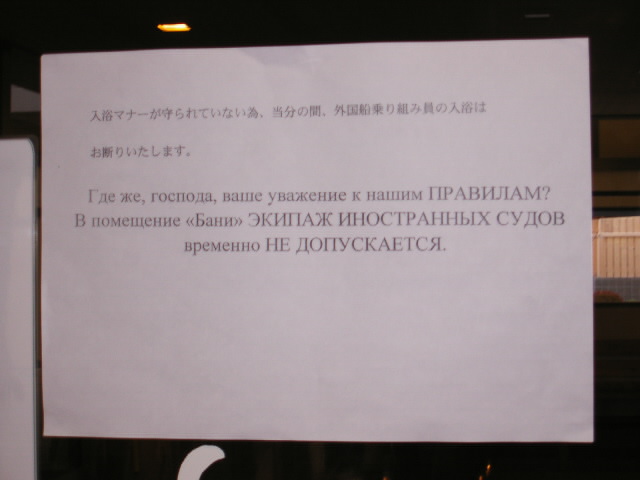

(click on pictures to see larger image)
OUR RECEPTION UPON ENTERING: Three of us entered separately. Eleven-year
Monbetsu resident James Eriksson was recognized at the counter and waved in. Olaf
Karthaus was let in once it was established he knew Japanese and how to take a bath.
Arudou Debito was likewise asked about his language ability and his knowledge of
bathing customs (informing them he is a Japanese citizen made no difference). Arudou
was shown a multilingual (Japanese, English, Chinese, Korean, and Russian) sheet
of bathing rules, asked if he would be willing to follow them, and was let in after
answering correctly in the affirmative.
THEIR SIDE OF THE STORY: According to the newspapers (http://www.debito.org/doshin090803.jpg
and http://www.debito.org/mainichi090803.jpg),
this public-private sector hybrid, which opened April 2003, was the site of unruly
Russian sailors smoking cigarettes in the bath and making a ruckus in the changing
room, causing several complaints. In August, they put up the abovementioned sign.
General Manager Mr Ohta confirmed this. However, he had no particular comment about
the alleged refusal of a Canadian JET in May or June, long before the incident with
the Russians.
TAKE DOWN THE SIGN? Considering doing so for the beginning of the new year,
2004.
APPRAISAL OF SITUATION BY AUTHOR: It is good that rules are being made clear.
Now a mechanism for enforcement. Police were not called when Russians made trouble,
for reasons left unclear by Mr Ohta.
3) VISITING RESTAURANT "JOY"
ADDRESS: Monbetsu-shi Saiwai-chou 4-1-1, phone 01582-4-6651
EXCLUSIONARY SIGN: (in Russian only at their front door) "People
who cannot speak Japanese or are unaccompanied by a Japanese speaker are refused".
Put up on opening day April 2003.


(click on pictures to see larger image)
OUR RECEPTION: Olaf Karthaus was speedily served by a very friendly middle-aged
waitress. So were Arudou, Eriksson, and a JET who was watching us from the sidelines
(and joined us for a meal). Food there is very good, BTW.
THEIR SIDE OF THE STORY: According to the waitress and the Assistant Manager
Mr Chino, JOY is run by a major restaurant and shop chain called "Kojinsha Life
Creation", which manages no less than 18 different shops in the Shin-Chitose
Airport complex, Hokkaido's largest air hub. The headquarters, hearing of potential
problems with local Russians, told JOY to put the sign up, even though no incident
had happened there. Waitress: "We offer all-you-can-eat and drink specials without
time limits. Russians drink a lot. We don't speak Russian. So there will be problems."
TAKE DOWN THE SIGN? Under consideration. The waitress is not happy with the
policy, and gave us the number of the head office in Chitose to inquire further.
That is: KK Koujinsha, Chitose-shi Bibi, Shin Chitose Kuukounai Catering Bldg 2F,
Phone 0123-46-5381.
APPRAISAL OF SITUATION: It is mysterious how the Chitose HQ feels it understands
the situation in Monbetsu, more than 300 kms away, well enough to refuse all Russians.
Ironic given Koujinsha's profiting from business at an international airport. Clearly
fear and rumor won out over common sense.
4) VISITING MONBETSU ONSEN "BIJIN
NO YU"
ADDRESS: Monbetsu-shi Minato-chou 7, Phone 01582-3-7909
EXCLUSIONARY SIGN: (in Russian only) "This place
for Japanese Only" up at least since 2000.



(click on pictures to see larger image)
OUR RECEPTION: Karthaus and Arudou admitted with no problems, except for
the older lady at the counter asking us why there was a TV camera filming us walking
in.
THEIR SIDE OF THE STORY: General Manager Mr Hayashi (who met Arudou in 2001
and remembered him) offered a magical mystery tour of logics: He wants the City of
Monbetsu to demand he takes the sign down, so he can bargain with them for some financial
support. Having lost half his business to the abovementioned new Tokkai no Yu bathhouse,
he wants to know how it is that the latter can refuse foreigners yet receive public
monies--while he gets criticized for excluding foreigners as a private-sector unsupported
business. He wants financial support from the City too. His proposal to make his
old bankrupt bathhouse (which he owned before Bijin no Yu) a specialty bathhouse
for foreigners, has fallen on deaf ears. Inexplicably, he will soon have no choice
but to knock down the old place at his own expense unless the City contacts him soon.
TAKE DOWN THE SIGN? Not unless the City comes forth and offers him a deal.
APPRAISAL OF SITUATION: Mr Hayashi is an interesting character. A lax enforcer
of his own rules, he then blames others for taking advantage of him. For example,
he readily admits that at his old place he let Russians walk in without paying, had
trouble keeping order, etc., yet would not call police to keep order or avoid bankruptcy.
A nice enough guy, Mr Hayashi lacks a certain horse sense in his business practices.
5) VISITING BARS AROUND MONBETSU
"HAMANASU DOORI"
We found four signs (out of the hundred or so that were up in 2000) which are
still displayed. Three bars, one yakitori place. Went to the only one of the bars
open that day.
ADDRESS: Sunakku "Don", Hamanasu Doori
EXCLUSIONARY SIGN: (in Russian only) "This place
only for Japanese" since 1995.


(click on pictures to see larger image)
OUR RECEPTION: Arudou Debito was alone, save for five reporters from the
print and broadcast media. The mama of the place was quite adamant about refusing
Arudou entry, saying it would be difficult to explain my presence to her customers
(although the place was empty, as it was 7PM). It was not until one of the reporters
intervened to vouch for Arudou's character, asking for some time to hear Arudou out
and give all five reporters in attendance a beer. Mama relented and started serving:
THEIR SIDE OF THE STORY: The Sunakku system in Japan is a complex one, with
service charges hard to explain in another language. Moreover, bars like these run
by women, often alone at night, are a soft target. There have been many incidents
(unquantifiable in number, but a guess by Mama and one of her hostesses was about
30 cases) over the past six years of Russians causing trouble, such as nonpayment
due to a surprisingly high-priced system, no sexual payback despite all the flirtation
and payout, and even one rumor of a gang rape (which did not make police reports
or the newspapers, as the alleged victim apparently would not file a report out of
personal shame). No, Mama's bar in particular had never had any problem, but the
sign was sold to them by the Restaurateur's Association as a preventive measure.
TAKE DOWN THE SIGN? Under consideration, after Arudou gave his spiel about
the public message signposting sends. Probably will not do it at this juncture--not
until the feeling of public safety is restored, say, by hourly stop-by patrols by
police.
APPRAISAL OF SITUATION: It was a good conversation on a serious problem. A
bar is not in the same category as a restaurant or a bathhouse--i.e. it is a luxury
service, not a necessity for personal health and hygiene, or food. It is also a purveyor
of strong and copious intoxicants, which will wild-card any situation. Therefore
the case for increased protection and more selection of clientele is warranted. Still,
the sign, and the instant fear incurred by any foreign-looking client (such as myself)
walking in, is something which needs to be resolved immediately by law enforcement.
6) VISITING KARAOKE PARLOR "O-EDO"
ADDRESS: Monbetsu Honmachi 5-chome, Phone 01582-3-1010
EXCLUSIONARY SIGN: (in Russian only) "This place
only for Japanese", up since 2001.


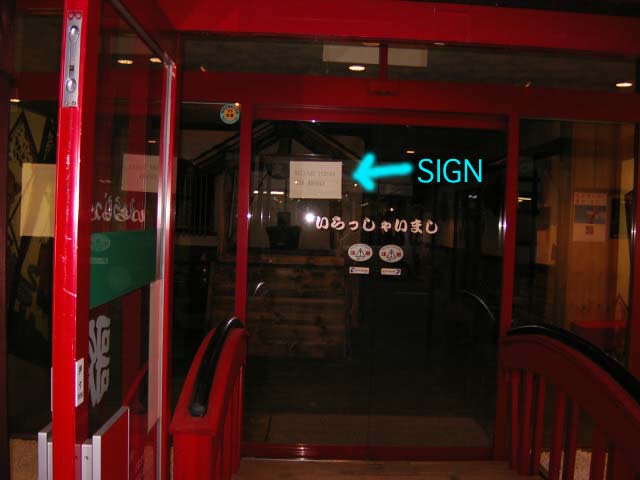
(click on pictures to see larger image)
OUR RECEPTION: Arudou was told he could rent a karaoke box with no problem
because he speaks Japanese. Membership necessary for everyone regardless of nationality--proof
of address required.
THEIR SIDE OF THE STORY: Manager Mr Ishikawa was worried about Russians getting
trashed and trashing their expensive karaoke equipment. No, there has never been
an incident of this, but their place is only two years old and the sign was up from
the start. Had heard that there was an incident at another karaoke box in town, but
was unable to answer why Russians would want to sing from a selection which did not
include any Russian songs. Was not aware that their sign said "Japanese Only"--had
thought it just refused all Russians--and expressed disquiet about that.
TAKE DOWN THE SIGN? Under consideration after our conversation, but unconfident
that they would ever be able to explain complicated karaoke machinery and price systems
multilingually. Arudou suggested they contact the head office of the karaoke company,
a national chain, as it no doubt has multilingual instructions (their book of selections
for foreign songs is an inch thick and includes about six countries outside the standard
pop music genres). Will look into it, they said.
APPRAISAL OF SITUATION: Another situation where rumor and the Restaurateur's
Association scared people into overcompensating. Still, their need for proof of a
domestic address is well understood. This is not a mere meal or a bath--they are
renting equipment out. A car rental agency or a video store likewise requires proof
of a home address to keep their property secure. So requiring customers to have a
tracable domestic address is perfectly reasonable. This does not, however, have to
be signposted as a blanket refusal of all foreigners.
7) CONCLUSIONS AND NEXT STEPS
It is a common enough social phenomenon--fear motivating people into doing irrational
and costly things. Michael Moore's movie BOWLING FOR COLUMBINE explores that very
well, and I bet he'd have a ball carrying a camera around Monbetsu.
Fear was certainly a factor here. Monbetsu cityfolk put signs up they didn't understand
to address a problem most of them had never experienced--only heard about in the
classic style of the rumor mill. It's hardly an exclusively Japanese reaction--history
shows that purges regularly occur against cults, witches, the privileged, Communists,
terrorists, hooligans, and in this case smelly Russian sailors allegedly with language
barriers, drinking problems, and sociopathic tendencies. Monbetsu is a textbook case
of how people can overreact.
Still there are exceptions, even here. The biggest yakitori place in town, Heiseien,
has a very clear sign up in Russian and Japanese:
---------------------------------------
"Trouble
is forbidden. Cause trouble and we call the police."
---------------------------------------
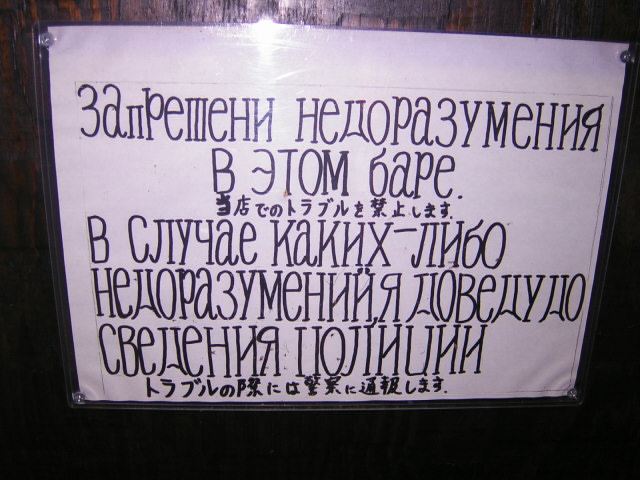

(click on pictures to see larger image)
No bones about that. Another bar, "Banya", caters to Russians, and a
staff member there whom Olaf befriended in the "Bijin no Yu" baths told
him that in the seven months he has worked there, there has been not a single incident
of trouble. Russians and trouble is not an equation.
Then there's the perpetual fear here of miscommunication and cultural conflict. Rongai.
I've said this many times before, but the problem here is not one of language barrier
or cultural difference, but of an individual's will to follow the rules. If the rules
are clear, even a chimp may follow them. If not, throw the bum out, Japanese bums
included.
More succinctly, the problem is one of public safety: that police are not called
upon, or do not come when called (according to some exclusionary businesses I've
interviewed). This may be due to the police's aversion to international incidents
and the paperwork that arresting a foreigner would necessitate. Consequently, businesses
feel the need to take the law into their own hands, like vigilantes, by signposting
and enforcing their own rules.
Time for the police to restore the public's confidence in them as a fall-back measure
in case of trouble. If they were to do their job properly when called upon, keeping
a lid on social miscreants when they act up, I bet this problem would dry up overnight
and signs would no longer be necessary.
In the end, let me stress that Olaf and I found Monbetsu to be a very friendly place.
People were very chatty and not at all standoffish once you got past the fear factor.
Pity the signs up around town don't reflect that.
THE NEXT STEP
Olaf and I will be returning to Monbetsu and Wakkanai in the winter months to resubmit
a Petition (chinjou) to the Monbetsu City Government, asking for the passing of an
anti-discrimination Ordinance (jourei), which will make signposted discrimination,
currently not unlawful in a Japan, illegal in Monbetsu. We think it will attract
a bit of fanfare. Will keep you posted. Thanks for reading.
Arudou Debito
Sapporo, Hokkaido, Japan
November 18, 2003
http://www.debito.org
ENDS
STATUS REPORT: (February 9, 2004) SUCCESS!
Thanks to all the press coverage and repeated entreaties to the management by Olaf
Karthaus and Arudou Debito to take the signs down, both Karaoke Parlor O-edo and
Restaurant "Joy" have taken their signs down (see photos below)
and opened its doors to customers of all nationalities. (Photos taken by Arudou
Debito and friends on February 6 and 7, 2004. Click on photos to see larger image.).
|
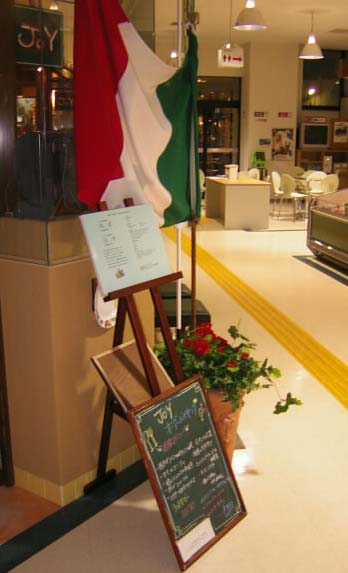
|
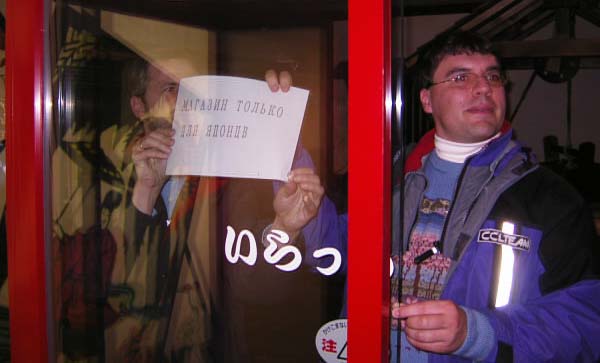
|
|
Restaurant "Joy" after removing its "Japanese
Speakers Only" sign from its menu stand.
(February 6, 2004, Monbetsu, Hokkaido)
|
Karaoke Parlor "O-edo" has its "Japanese Only"
sign in Russian taken down by Olaf Karthaus (left) and Arudou Debito.
(February 8, 2004, Monbetsu, Hokkaido)
|
However, the signs still remain up at Sunakku "Don" and Monbetsu Onsen,
as well as 26 other places around Monbetsu, according to local sources which went
from bar to bar on a sign hunt on January 30, 2004.
Copyright 2003-2004, Arudou Debito/Dave Aldwinckle, Sapporo, Japan







